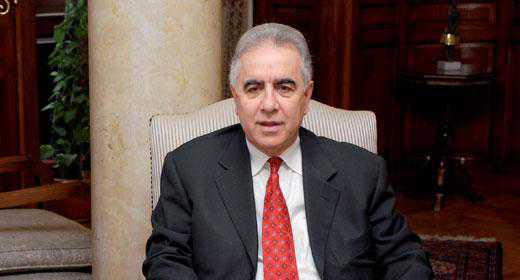This is the amazing tale of the Turkish government handing over to Istanbul’s Armenian Patriarchate in the 1920’s some of the church effects looted during the Genocide.
According to attorney Loutfig Kouyoumjian’s book, Hay Hamankayin Antsoutartser: 1927-1950 [Armenian Community Happenings: 1927-1950], published in Istanbul in 1950, the Turkish government had turned over to the Armenian Patriarchate 64 large crates full of church effects. Kouyoumjian was a member of the Patriarchate’s Finance Committee.
The returned items included crowns inlaid with diamonds and pearls, vestments, garments with gold threads and silver crosses, a belt buckle from the famous Abousheikh Church with golden latches decorated by diamonds, emeralds and rubies, 72 rugs belonging to Sourp Garabed Monastery and Sourp Krikor Lousavorich Church of Gesaria, and churches in Talas and other regions, and a gold box covered with precious stones containing several saints’ relics. Another crate had the vestments of Gomidas Vartabed, his gold fountain pen, and valuable manuscripts of his musical arrangements of church liturgy. The Locum Tenens Archbishop Kevork Arslanian signed a receipt acknowledging his acceptance of these items and appointed Archpriest Drtad Boyajian as their guardian.
The list of the returned items prepared by the Patriarchate included “scrolls, manuscripts, and antique books. In keeping with the laws on antiquities, the books were delivered to the Istanbul Museum.”
These revelations raise several important questions. What happened to the returned church effects? Our investigation indicates that none of these items are currently in the custody of the Armenian Patriarchate. A few of them were handed to Armenian clergymen of Istanbul, while others were sent to Etchmiadzin. The overwhelming majority simply vanished several decades ago, most probably stolen and sold.
Mr. Kouyoumjian reported in his book that in the late 1920’s, Judge Haroutioun Mosdichian, Chairman of the Patriarchate’s Executive Committee, informed the Finance Committee that he had solid evidence that several of the returned silver pieces were sold at the Istanbul jewelry market. Mosdichian was a highly respected individual who had occupied important positions in the Turkish government. The Finance Committee immediately sealed the room where the returned items were stored. The next day, Abp. Arslanian broke the seal and left the door of the storage room open. The Archbishop then dismissed the Committee members.
A special investigative committee, including Mr. Kouyoumjian, then conducted a thorough search and transmitted its findings to the Executive Committee. The latter blamed not only Mosdichian but also Abp. Arslanian of wrongdoings regarding the returned church effects. Abp. Arslanian in turn accused Patriarch Mesrob Naroyan of being responsible for the missing items. After Patriarch Naroyan formed a committee to update the list of the remaining church effects, he discovered that almost nothing was left of the contents of the 64 crates delivered earlier to the Patriarchate.
In his book, Kouyoumjian relates another strange tale regarding the rugs delivered to the Patriarchate by the Turkish government. On March 8, 1924, two Turks — Haje Ismail, the son of Molla Khalil of Gesaria, and Mehmet of Talas — presented to Abp. Arslanian a written demand, claiming that nine of the rugs had nothing to do with the Armenian Church and must be returned to them. When the Patriarchate rejected their request, the Turks filed a lawsuit against Abp. Arslanian, claiming that the nine rugs were worth 1,975 Ottoman gold pieces.
On January 26, 1924, attorney Kouyoumjian defended the Patriarchate’s interests in court. Strangely, the Patriarchate agreed to settle the lawsuit by paying 500 gold pieces to the two Turks. Several years later, when Mr. Kouyoumjian inquired about the disposition of those rugs, he was told that there were no such rugs at the Patriarchate.
In light of this newly found reference to the Turkish government’s return of church effects, the Armenian Patriarchate must now conduct a thorough investigation of its archives to review its records of the missing items.
More importantly, by having returned the 64 crates, the Turkish government had in effect admitted the theft of Armenian Church properties during the Genocide. A lawsuit must be filed not only against the Istanbul Museum for the antique books it improperly received in the 1920’s, but also against museums and libraries throughout Turkey for the return to the Armenian Patriarchate of the vast number of religious effects looted from several thousand Armenian churches!


